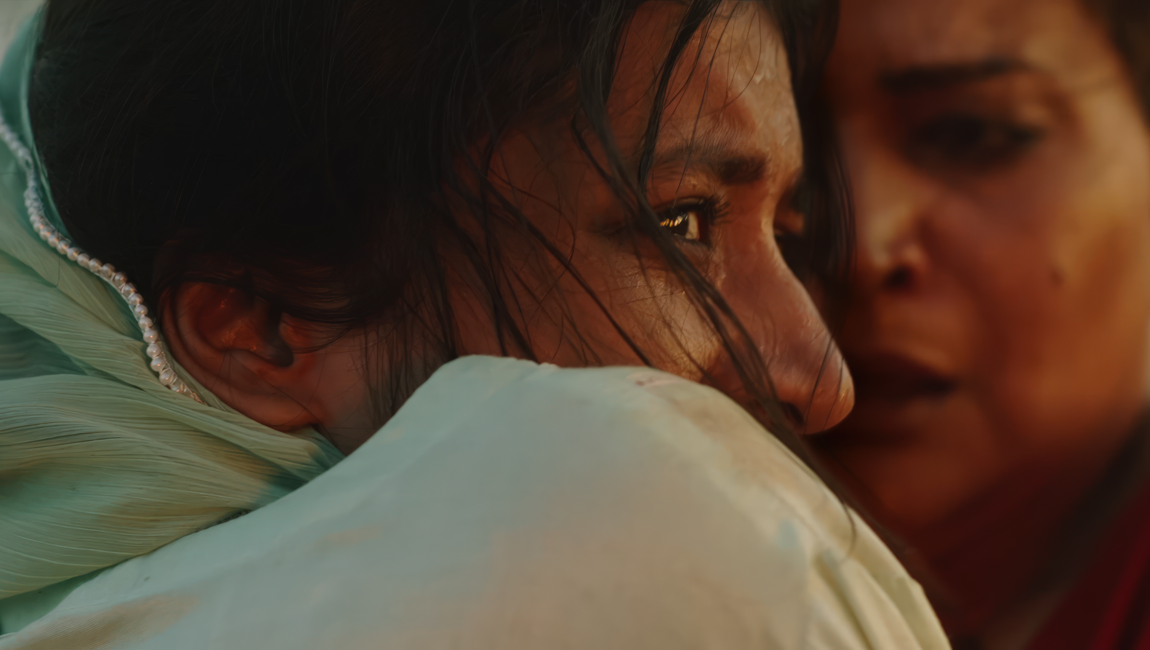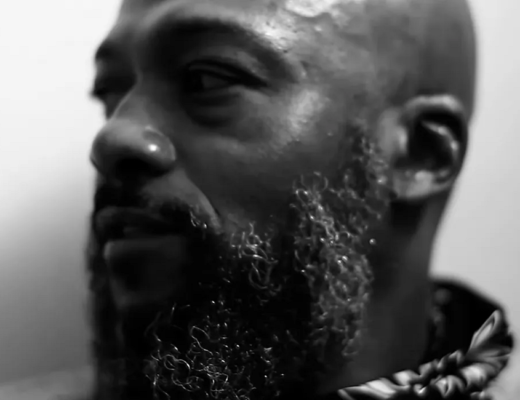There are two films that writer-director Zarrar Kahn struggles to reconcile in his feature-length debut In Flames. The first, a domestic drama about women struggling against an entrenched patriarchal system in modern-day Karachi, is a resounding success, fueled by a remarkable performance courtesy of actress Ramesha Nawal; the second is significantly less interesting, a series of familiar elevated horror tropes that literalize the fear and confusion already inherent in the subject matter, rendering it cliched in the process. Still, there is much to like in this peculiar mishmash, even if it’s not an entirely satisfying whole.
Nawal plays Mariam, who, as the film begins, is dealing with the immediate aftermath of her grandfather’s death. She’s an intelligent, capable young woman, and needs to be, since her mother, Fariha (Bakhtawar Mazhar), is a bundle of nerves, unsure of how to proceed now that her father has passed. Mariam also helps care for her younger brother, and it quickly becomes clear that her grandfather had been supporting Fariha and the children. The sudden onset of his illness has led to medical debt, as well as a number of past-due utility bills. As Mariam attempts to keep up with her studies (she is going to college to become a doctor), she must also keep her mother from doing anything too rash. Enter Nasir (Adnan Shah Tipu), Fariha’s uncle, who offers to pay off all of the family’s debt. Fariha is overwhelmed at his generosity, while Mariam is wary of this unexpected gift, apparently out of character for Nasir. Kahn sketches in this complicated family dynamic with a deft hand, juggling multiple characters and competing agendas with speed and clarity. The family apartment is cramped, overflowing with the accumulated bric-a-brac of three generations of people. Characters are often filmed at jagged angles, cut-off or otherwise constrained within the frame by walls and windows. Mariam frequently sits out on a landing, observing the street below her, but Kahn is careful to arrange her so that she is constricted by the window frame. It’s all designed to reinforce Mariam’s imprisonment via visual means rather than spelling things out in banal platitudes.
It’s a complicated familial situation, but Mariam seems to be handling it reasonably well. So it is extremely jarring when, while driving herself to school, Mariam’s car is attacked by a man with a brick. He smashes out her window and starts grabbing at her, shouting “whore” as she struggles to free herself and speeds away. Rattled but determined, Mariam gathers two friends and returns to the scene of the crime, where Asad (Omar Javaid) confronts a group of men and argues with them. It’s a bracing reminder of the conflicting social mores in modern Pakistan — Mariam wears a hijab, although it is not mandated by law (many women at her school choose not to). She can also drive herself around, but obviously runs the risk of offending particularly conservative factions that are still very much present. Mariam insists on reporting the assault to the police, despite her friend’s protests, and is pointedly ignored by the officer on duty, until Mariam informs him that her recently deceased grandfather was the chief. She’s clearly not afraid to assert herself, and while she initially rebuffs Asad’s romantic overtures, eventually she relents and begins a casual relationship with the eager young man.
Kahn has clearly articulated the complicated daily life of these women, which is why it’s so disappointing when he begins introducing horror elements to the proceedings. It’s fairly obvious stuff; a quick cut of grandfather’s ghost sitting in the dark corner of a room, or cryptic dolly shots that linger on empty spaces, as if waiting for a jump scare to materialize. There’s a sort of mystery surrounding the absence of Mariam’s father; all the audience knows is that he has passed away at some point in her childhood. But the horror of ghosts and specters is nothing compared to the very real challenges Mariam and her mother face in their everyday lives. Eventually, an event occurs that separates Mariam and Asad, leading to a series of “is she going crazy or is something after her?” moments. By the time Mariam and Fariha join forces to exorcise their shared trauma, you might be inclined to roll your eyes. It’s an uninteresting detour into well-trod genre territory, even if the film’s heart is very much in the right place. Still, two-thirds of a good movie is nothing to turn your nose up at, and in a just world this will be the beginning of an illustrious career for the riveting Ramesha Nawal.
DIRECTOR: Zarrar Kahn; CAST: Ramesha Nawal, Bakhtawar Mazhar, Omar Javaid, Mohammad Ali Hashmi; DISTRIBUTOR: Game Theory Films; IN THEATERS: April 12; RUNTIME: 1 hr. 38 min.







